The Best Online Property Management Software
We reviewed the most popular web-based property management software and selected our favorites for commercial and residential firms of all sizes.
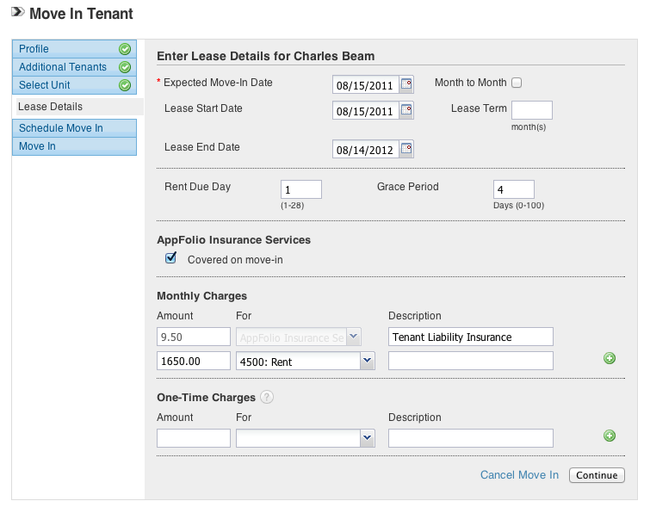
- Modern and intuitive user interface
- Strong universal search input
- AI leasing and accounting features
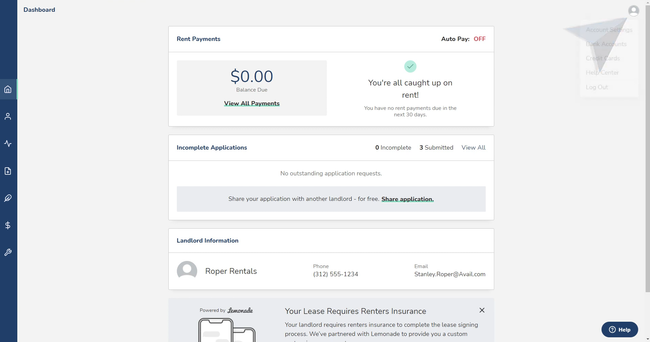
- Free for landlords plus unlimited units
- Includes an online tenant portal for renters
- Integrates with listing sites like Realtor.com and Apartments.com
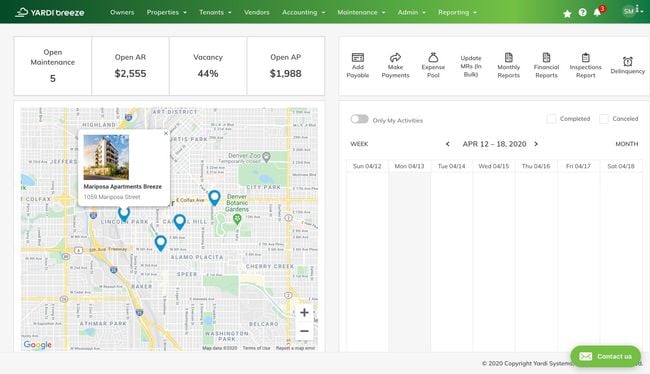
- Available for mobile use anywhere
- Cuts down on time-consuming tasks
- Integrated property management and accounting
Cloud property management software is a an online platform that handles tasks like tenant screening, rent collection, maintenance requests, and financial reporting. We utilized our review methodology to rank the top solutions for HOAs, associations, and small to large property management firms.
- Appfolio: Best Overall
- Avail: Best for Independent Landlords
- Yardi Breeze: Best for Mixed-Portfolio Small Property Managers
- Buildium: Best for Residential Complex Managers
1 Appfolio - Best Overall
Why We Chose It: AppFolio earned a 9.4 from us thanks to its cloud-based features, tailored to manage large residential portfolios. Its full suite of tools includes a resident portal, online applications, and an AI assistant for rent collection and lease signing.
We like that the platform has a mobile inspection app to help maintain property values. We also found managing work orders and maintenance requests fairly simple. Additionally, Appfolio’s customizable reports and dashboards, including income statements and balance sheets, cater well to the needs of large-scale property managers.
On the other hand, the pricing structure could be a drawback for smaller portfolios, requiring a minimum of 50 units at $1.49 per unit per month. The lack of a fully open API limits extensive customization and integration with third-party apps.
2 Avail - Best for Independent Landlords
Why We Chose It: We gave Avail a solid 8.9 for its free plan suited for independent landlords managing a few properties. Features include syndicated rental listings you can post in one click across popular sites like Realtor.com and Apartments.com.
Avail’s free plan also provides state-specific, lawyer-reviewed lease templates with customizable clauses that can be signed digitally. Its tenant screening tool includes credit, background, and eviction checks, as well as online payments for residents. You can enhance this feature by bumping up to the Plus plan for FastPay, allowing for next-day rent payment deposits.
However, we found that Avail does not offer a dedicated mobile app. While the Avail website offers a mobile-friendly experience via a web browser, this could still be a sticking point for landlords preferring an app-based approach.
3 Yardi Breeze - Best for Mixed-Portfolio Small Property Managers
Why We Chose It: Yardi Breeze earned a score of 8.8 for its ease of use and scalability. It’s our top pick for small property management companies that handle self-storage, associations, and residential and commercial properties.
Cloud-hosted and streamlined, Yardi Breeze offers a simple, user-centric design and tools for marketing, leasing, operations, and accounting. We also found it adept at handling online payments, maintenance requests, and lease signing. Its accounting tools are worth mentioning too, with automated invoice processing, financial reporting, and CAM reconciliation.
Additionally, Yardi Breeze starts at $1 per unit/month, making it affordable for many property managers. However, there’s a minimum monthly cost of $100, and you’ll need to get the Premier plan to get custom reporting capabilities.
4 Buildium - Best for Residential Complex Managers
Why We Chose It: We added Buildium to our list because of its tenant management and accounting features, ideal for residential complex managers. We like that Buildium has purpose-built financial tools, including tracking and filing Form 1099s.
With functions similar to QuickBooks Online, the software automates many aspects of property accounting, from tenant payments to bank reconciliations. During our demo of Buildium, we noted its wide range of templates and drop-down menus. We found this customizable layout makes viewing and modifying financial data for each property, property owner, client, and vendor much easier.
Buildium can help advertise vacancies, customize rental applications, run tenant screenings, and collect electronic lease signatures from any device. However, we encountered some limitations. For example, the basic plan does not include live support, and Buildium charges a fee to set up bank accounts.
5 RealPage Commercial Property Management
Why We Chose It: We picked RealPage because it’s a strong fit for firms managing office buildings, retail properties, and industrial facilities. That’s because the platform specializes in everything from common area management to commercial-specific maintenance issues.
Our research shows that RealPage covers core functionalities, including common area maintenance (CAM) recoveries, tenant portals for payments and service requests, and lease accounting and administration. It accomplishes the latter through tools like lease boilerplates, amendment tracking, and customizable fields to manage specific data.
We also found that RealPage supports detailed financial management, including precise billing calculations related to CPI increases. However, RealPage does not list its pricing publicly and requires a consult call for a quote.
6 RentRedi
Why We Chose It: RentRedi made our list because it offers a unique pay-as-you-go pricing model at $29.95/month. This includes unlimited properties, tenants, and free teammate accounts. Key features that make RentRedi appealing include its tenant screening and maintenance management capabilities.
The software simplifies rent collection by allowing tenants to pay rent via mobile devices using various payment methods, including debit, credit, and ACH transfers. RentRedi also supports automatic late fee calculations and reminders, helping to maintain timely payments.
Additionally, RentRedi aids in property listing and marketing, integrating with major real estate platforms like Realtor.com and Zillow. However, you’ll need to sync RentRedi with REI Hub for accounting functionality, and the software does not integrate directly with QuickBooks.
7 Entrata
Why We Chose It: We found Entrata best for large property management companies needing a customized and integrated platform. Features include accounting, asset management, and utility billing, making it suitable for managing extensive portfolios efficiently. We also like that Entrata offers customizable lease documents, allowing managers to tailor agreements to specific tenant or property requirements.
During our research, we found that Entrata even covers specialized features for managing student housing properties. Plus, it integrates well with listing services like Zillow and Apartments.com, aiding in effective marketing and leasing efforts.
However, Entrata does not publicly publish its pricing, so you’ll need to contact them for a custom pricing package. Some users have also noted challenges with software updates that can disrupt existing integrations, and the platform does not include a native email inbox.
8 DoorLoop
Why We Chose It: We picked DoorLoop because it’s a good fit for international property managers. It supports rentals in over 100 countries with multi-currency capabilities. These include residential and commercial properties, student housing, mobile homes, and affordable housing. It also has strong accounting features to track all financial transactions, perform bank reconciliations, and manage payments through ACH, credit, and debit cards.
We found that DoorLoop makes creating and tracking maintenance requests and work orders fairly easy. It allows users to upload files, specify work details, and manage maintenance tasks from initiation to completion. It also simplifies tenant screening, lease management, and rent collection processes through a tenant portal.
However, we don’t recommend DoorLoop for independent landlords or smaller companies. For portfolios under 20 units, you might find more cost-effective options like Avail.
9 TenantCloud
Why We Chose It: We added TenantCloud as one of the more affordable options out there, starting at $17/month for unlimited properties and units. It’s optimal for small to medium-sized property management companies, offering a cost-effective and scalable platform.
We like that TenantCloud includes tools for tenant screening, including criminal history, eviction history, income verification, and credit history. And once tenants are selected, you can use the platform to e-sign leases, streamlining the onboarding process. Additionally, the platform supports online rent collection through various payment methods like debit cards, credit cards, and ACH transfers.
TenantCloud enables tenants to submit and track maintenance requests online. The platform offers scalable subscription plans for DIY landlords and large property businesses. However, more advanced features are reserved for higher-tier plans. For instance, the Starter plan is limited to 15 leases, one bank account, and 50 pieces of equipment, including appliances and lawn care items.
10 Condo Control
Why We Chose It: Condo Control made our list because it’s specifically designed for HOAs and condominiums. We found it particularly strong in communication, record-keeping, and enhancing resident engagement. It also includes tools to automate package tracking, visitor parking, and security patrols, all of which help to make security or concierge teams more efficient.
We like that residents can log maintenance issues through the Condo Control platform and submit requests directly to the property management team. The system allows residents to view the status of their requests, receive updates, and communicate with the maintenance staff. It also supports online payment processing, including ACH, electronic funds transfer, and credit and debit cards.
On the other hand, Condo Control lacks a built-in tenant screening feature. This might not be an issue for condominiums and HOAs, which tend to be more concerned with maintenance, communications, and community management rather than tenant placement.
What Is Online Property Management Software?
Online property management software is a web-based platform offering online payment processing, tenant screening, and maintenance request tracking. This type of software typically includes features for managing leases and generating financial reports. It may also provide functionalities for marketing rental properties and managing legal compliance.
Use Cases
- Residential Landlords: This software automates daily tasks for landlords who manage multiple rental units, such as collecting rent online, managing lease renewals, and tracking maintenance tasks.
- Commercial Property Management: These tools can help manage commercial properties like office spaces or retail locations, schedule property maintenance, and manage lease agreements with multiple tenants.
- Real Estate Investment Groups: Groups that manage large portfolios of properties benefit from the scalability of online rental software, which can handle vast amounts of data on properties, leases, and tenants.
- HOA and Condo Management: These tools can assist homeowners associations and condominium managers in collecting dues, managing community operations, and enforcing community standards.
- Vacation Rentals: Software for managers of short-term vacation rentals can integrate with online booking platforms, streamline guest communications, and handle dynamic pricing.
User Base
- Small to Medium-Sized Property Managers: These users typically seek integrated solutions that combine property management functionalities with accounting features. This includes tracking rent payments, managing operational expenses, and generating financial reports.
- Large Property Management Firms: These firms need platforms to manage extensive portfolios with numerous properties and tenants efficiently. They require sophisticated features like data analytics, bulk lease processing, and extensive reporting capabilities.
- DIY Landlords: They often start with manual methods like spreadsheets for managing finances, tenant records, and maintenance schedules. They may shift to property management software to automate these tasks and reduce the potential for errors inherent in manual data entry.
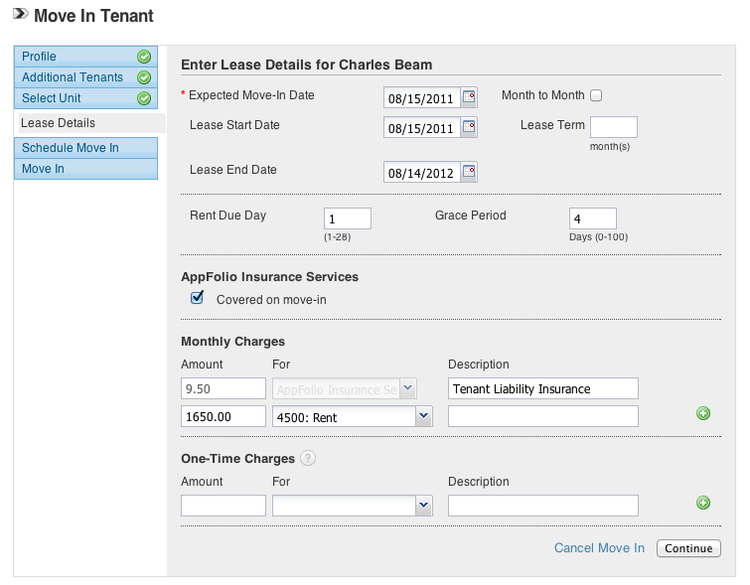
Key Features
Key features of cloud rental software include tenant management, maintenance request tracking, and financial tools.
| Key Features | Description |
|---|---|
| Tenant Management | Manages all aspects of tenant interactions, from screening and leasing to rent collection and communications. It simplifies finding and retaining tenants and provides tools for managing tenant issues. |
| Maintenance Management | Tracks and manages maintenance requests and schedules repairs, allowing landlords or managers to assign tasks to maintenance staff or external contractors. |
| Financial Management | Includes tools for tracking all financial transactions, such as expenses and rent payments. It provides reports that help in budgeting and forecasting. |
| Lease Management | Automates lease management processes, including tracking active leases, storing lease documents, and managing renewals. |
| Marketing and Advertising | Facilitates property listings on various platforms, manages potential tenant leads, and integrates with rental websites. |
| Compliance Management | Helps property managers stay compliant with local and national regulations by providing updated legal templates for contracts, tracking regulatory requirements, and managing the eviction process if necessary. |
| Reporting and Analytics | Offers dashboards and custom reports like income statements, vacancy rates, rent roll reports, and lease expiry reports. |
| Mobile Access | Provides mobile applications for property managers and tenants, including rent payments, maintenance oversight, and communication tools. |
Core Benefits
Web-based property management software has several benefits, including automating rent collection, maintaining maintenance records, and tracking income and expenses.
- Efficiency and Time Savings: Automates many day-to-day tasks such as rent collection, lease management, and maintenance requests, significantly reducing the time spent on manual processes.
- Improved Financial Management: Provides tools for tracking income and expenses, generating detailed financial reports, and forecasting budgets.
- Enhanced Tenant Communication: Features communication portals and notification systems that facilitate easy and direct communication between property managers and tenants, improving tenant satisfaction and retention.
- Centralized Data Management: Consolidates all property management activities into a single platform, making it easier to access and manage tenant information, leases, payment histories, and maintenance records from anywhere.
- Scalability: Easily adapts to the growing needs of a property management business, allowing for the addition of new properties and tenants without significant increases in workload or complexity.
- Cloud-Based Convenience: As a cloud-based system, it ensures data is backed up and secure, allows for remote access from any device with internet connectivity, and reduces the need for local IT maintenance and support.
- Regulatory Compliance: Helps keep properties compliant with local, state, and federal regulations by providing updated legal templates and automated compliance checks.
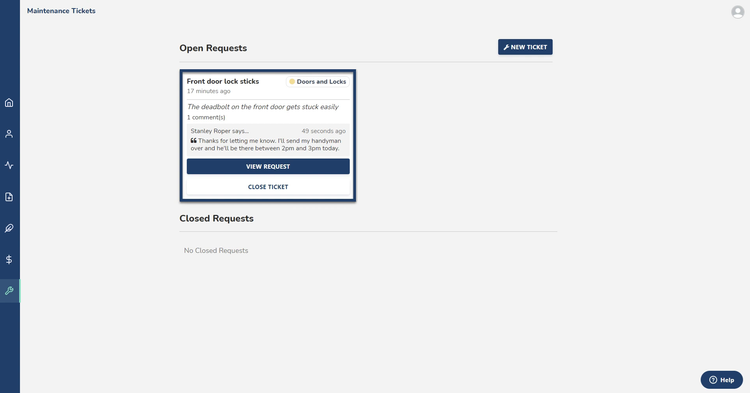
How to Choose
When choosing the best cloud property management software, consider your company size and the types of properties you manage:
Company Size
- Small Businesses: Opt for cost-effective solutions for tenant communication, lease tracking, and basic accounting. These tools should be straightforward and easy to use, accommodating the limited resources typically available in smaller operations.
- Medium-sized Businesses: Consider platforms that offer advanced tenant management capabilities, including automated tenant screening processes and enhanced accounting tools like detailed financial reporting and rent collection systems. These features should support a growing business and smoothly handle a higher volume of transactions.
- Large Enterprises: Prioritize sophisticated capabilities such as integration with ERP software, management of multiple properties across different regions, and the ability to generate customizable reports on financials, operations, maintenance, and tenant activities. The software should be highly scalable and customizable.
Type of Property Portfolios
- Residential Properties: Software should offer features like tenant screening, maintenance request handling, and lease management.
- Commercial Properties: Needs might include support for complex lease structures, CAM reconciliation, and detailed occupancy reports.
- Vacation Rentals: Look for software with strong booking management features, channel integration with platforms like Airbnb, and dynamic pricing tools.
- Condominiums and HOAs: Essential features include board management functionalities, homeowner communication tools, and fee collection for amenities and services.
Features and Functionality:
- Tenant Management: The software includes automated tenant screening, provides online lease agreements, and offers tenant portals for enhanced communication and management.
- Accounting: It features comprehensive tools for generating detailed financial reports and efficiently tracking rent payments and expenses.
- Maintenance Management: The system offers features for submitting, tracking, and managing maintenance requests and coordinating with vendors.
- Communication Tools: The software provides various communication channels for tenants, staff, and vendors to facilitate seamless interactions.
- Integration: It integrates seamlessly with other systems, such as CRM software, payment gateways, and other real estate management tools, enhancing overall operational efficiency.
- Mobile Functionality: The platform includes mobile apps or mobile-optimized websites that allow users to manage tasks on the go, including features like payment processing, maintenance request management, and tenant screening capabilities.
Other Considerations
- Scalability and Flexibility: Software grows with your business, easily accommodating additional properties or adapting to new types of properties.
- Security and Compliance: Includes security measures to protect sensitive data and compliance with regulations like GDPR for European users or local housing laws.
- Cost: Evaluate the pricing structure against the features offered. Some platforms may charge per unit, while others offer flat rates.





































































